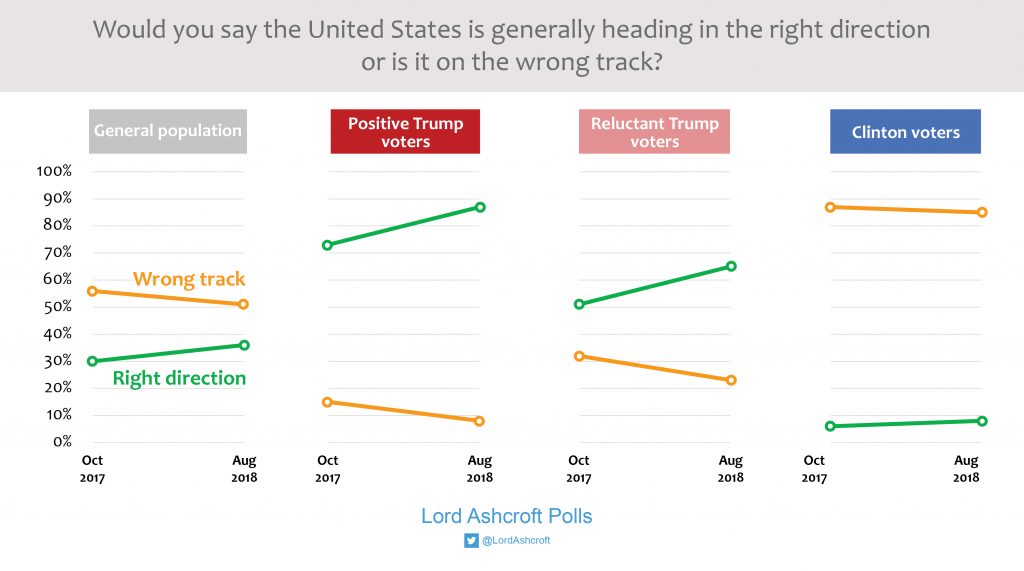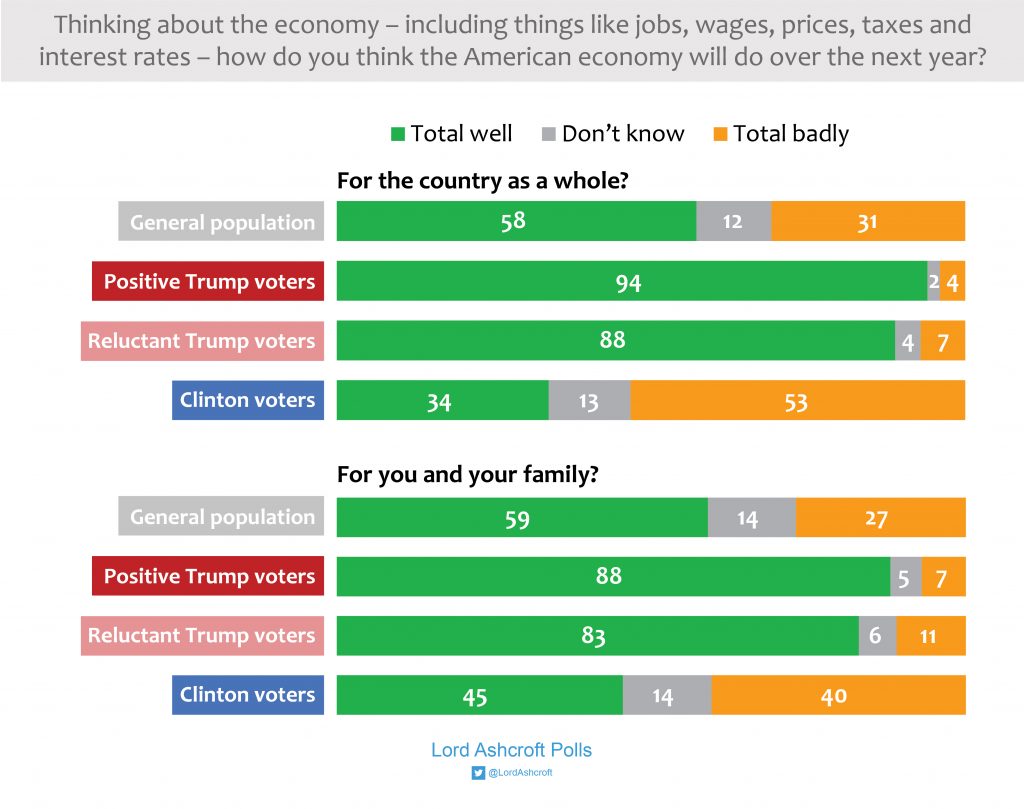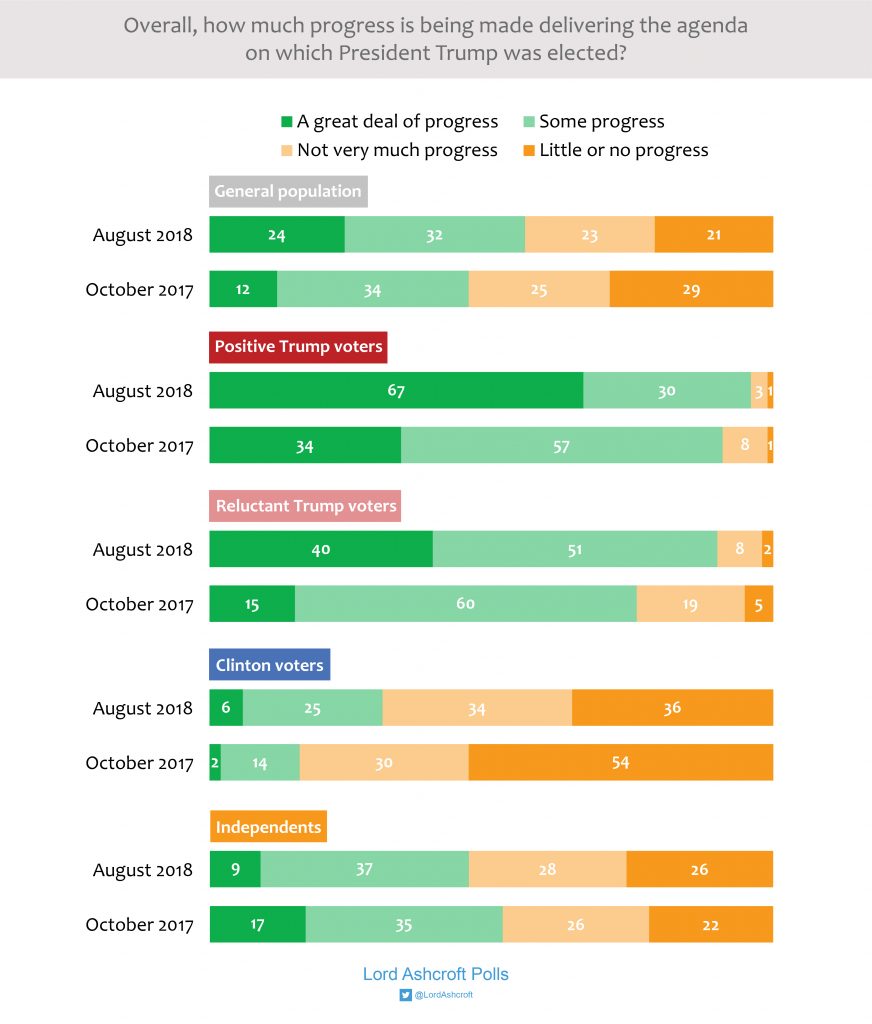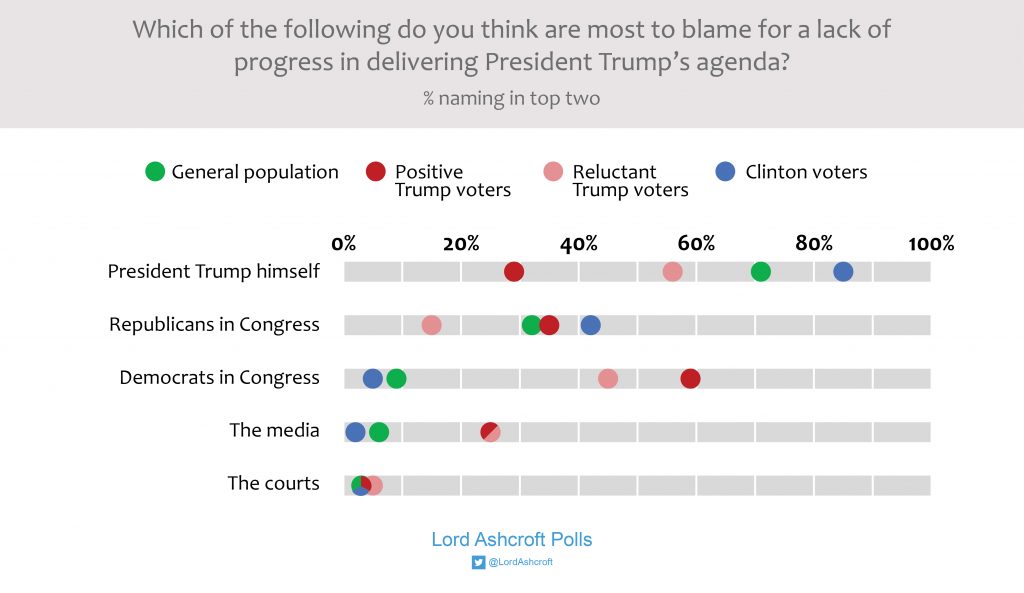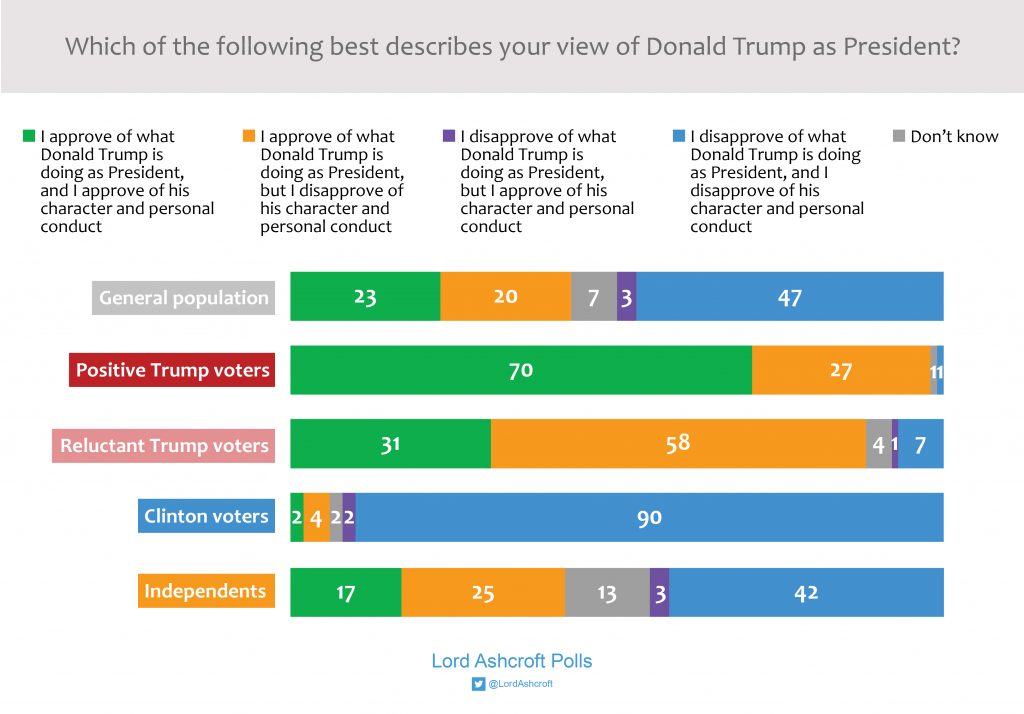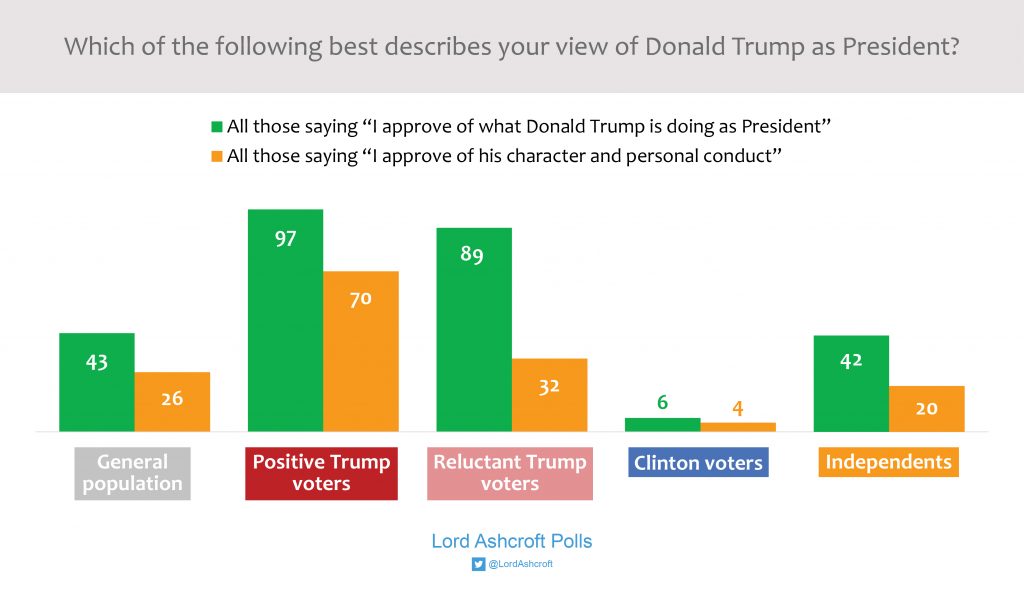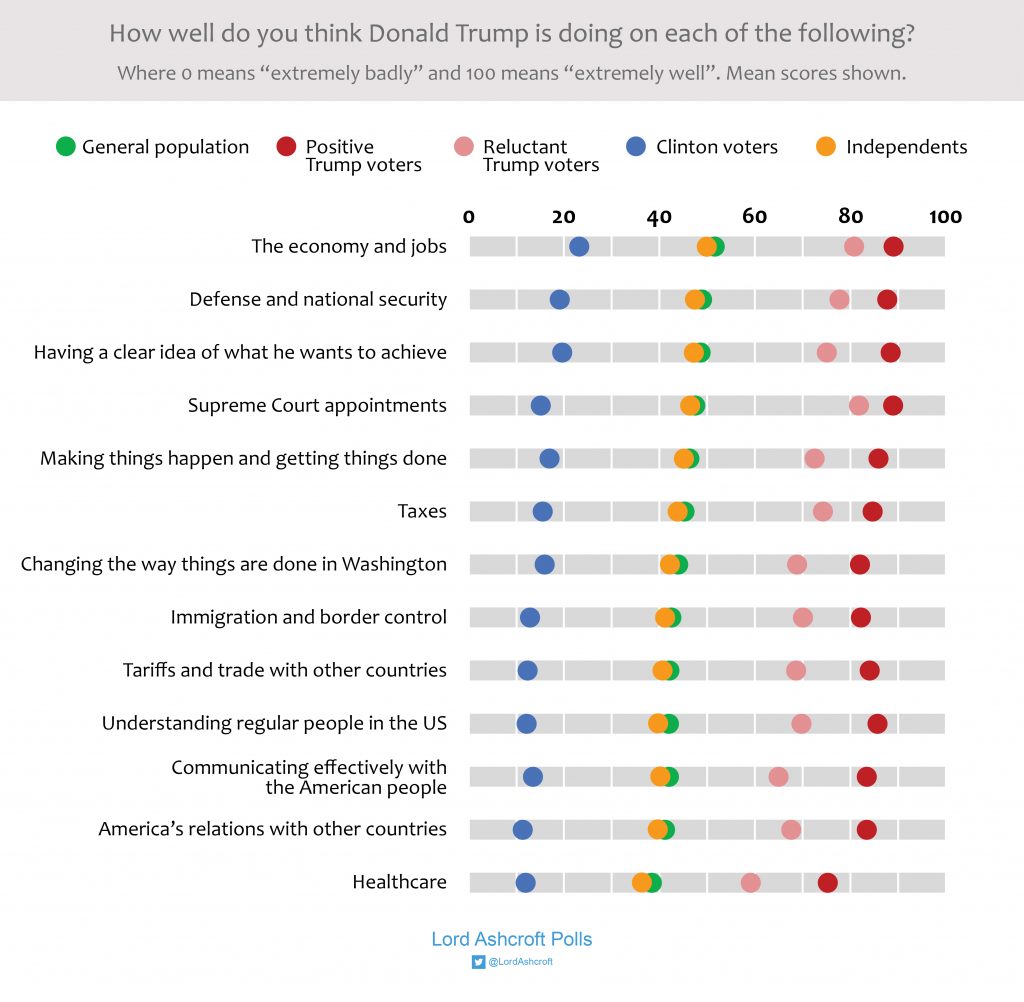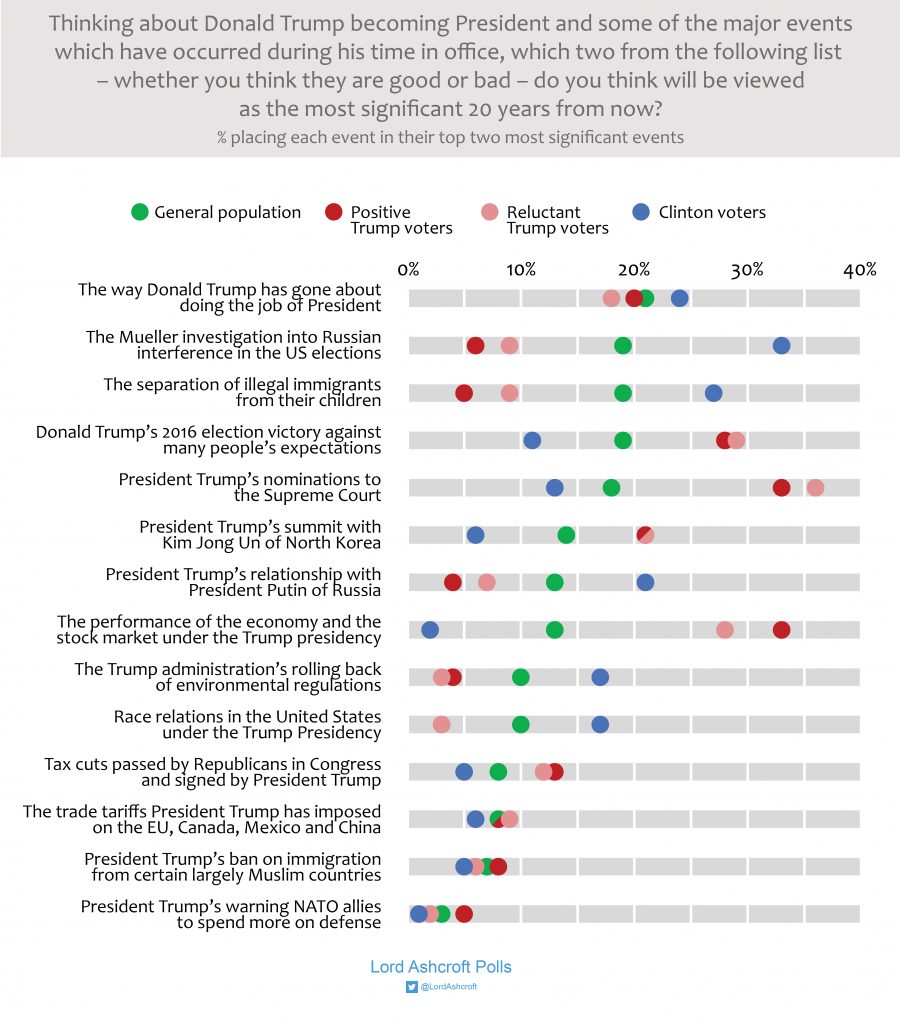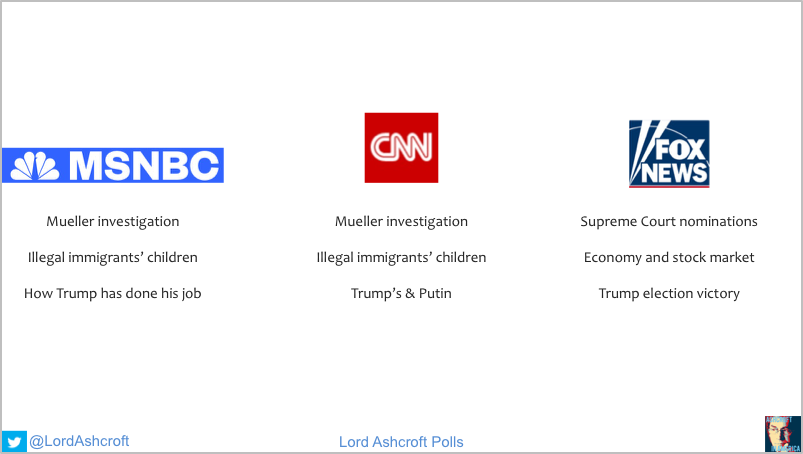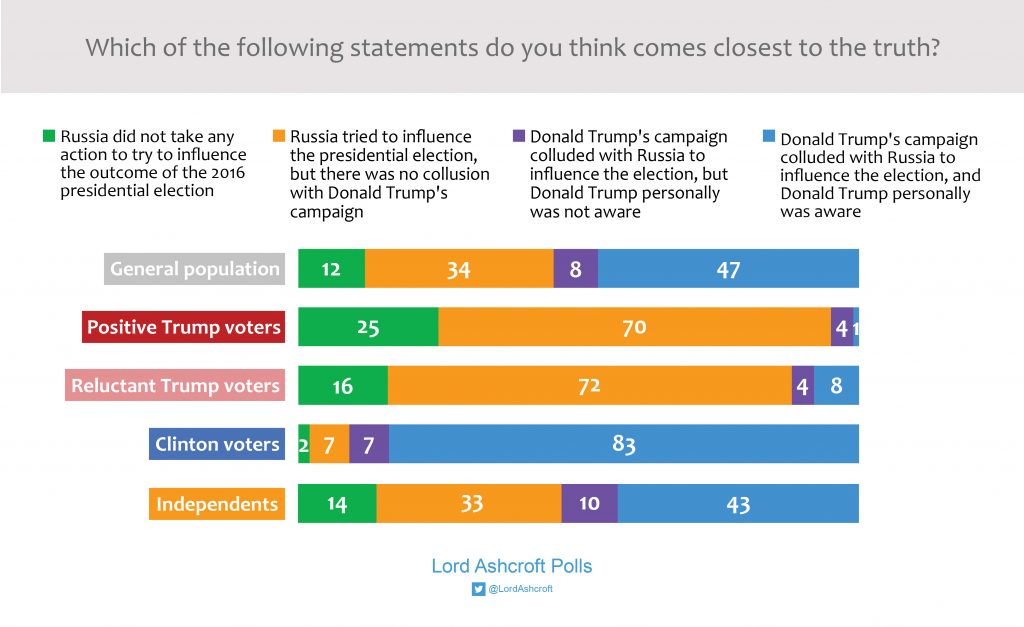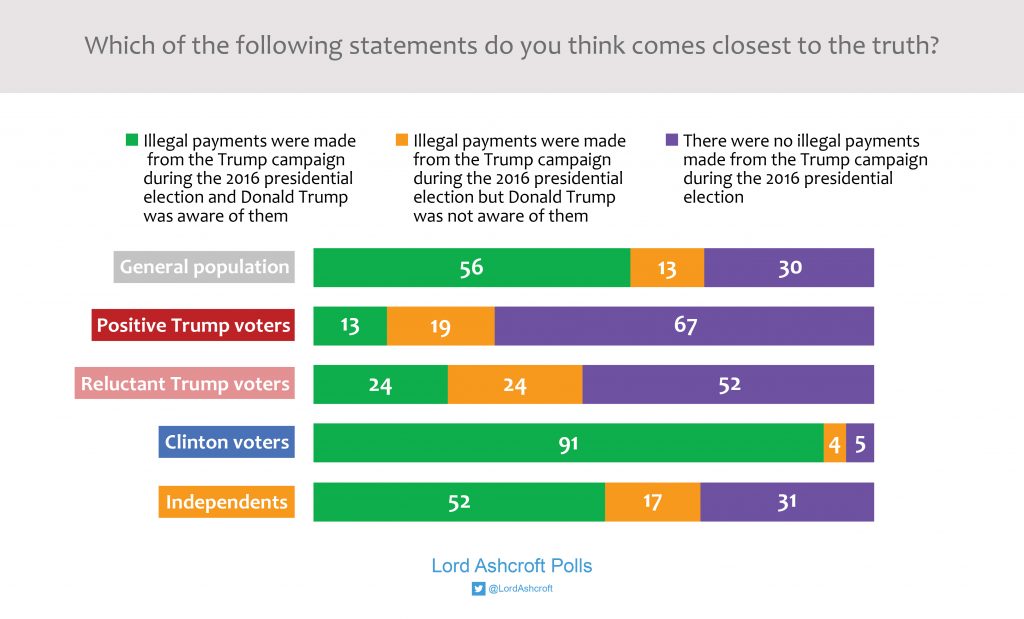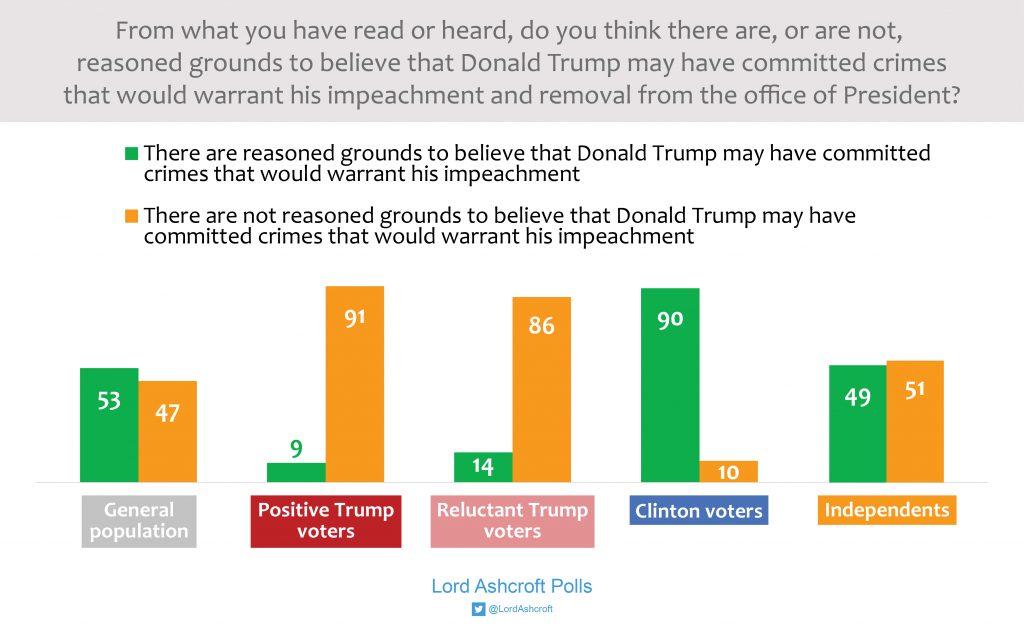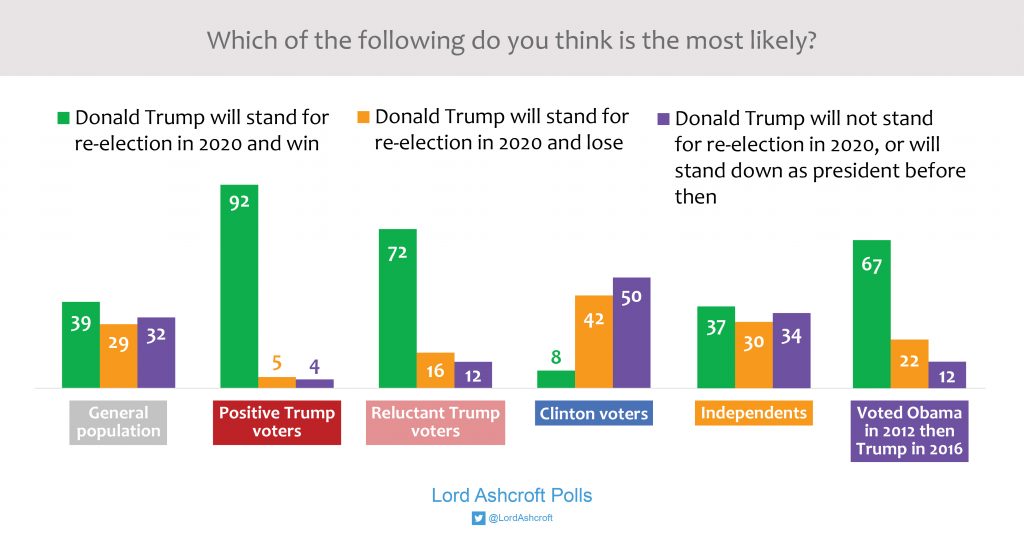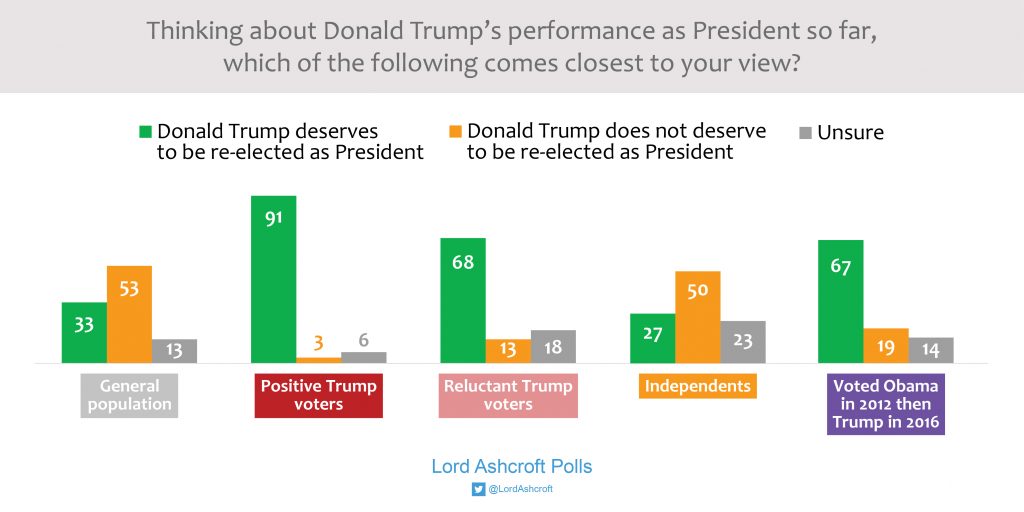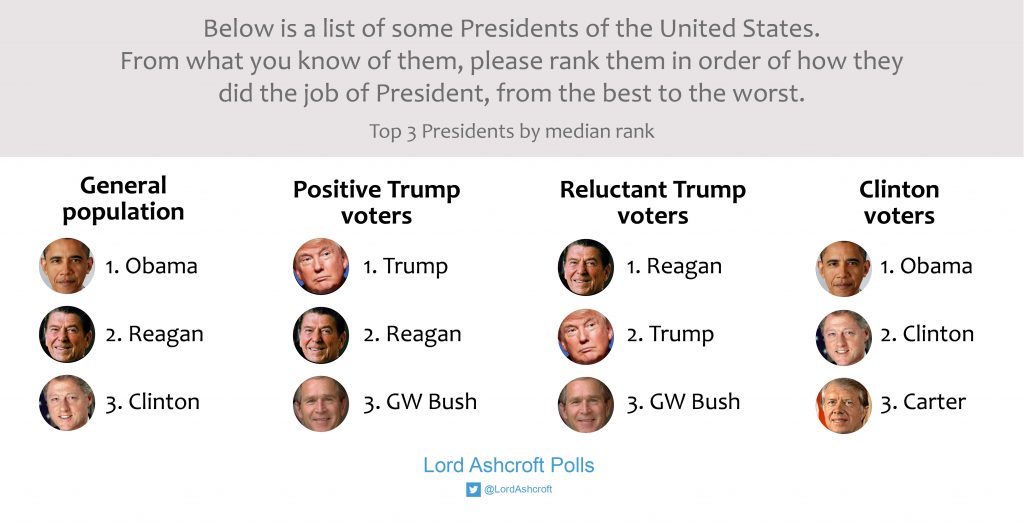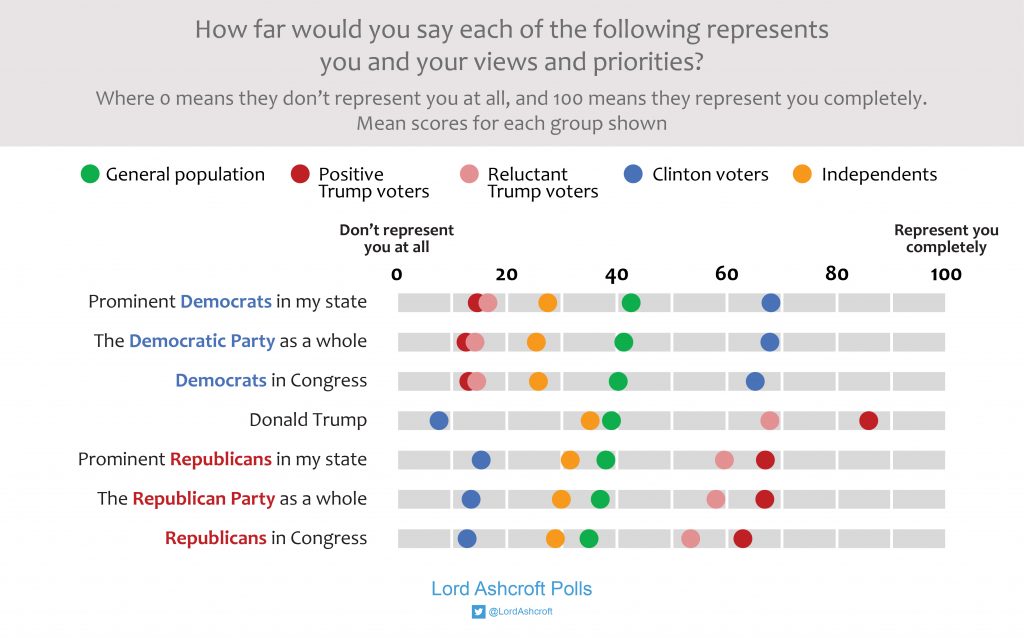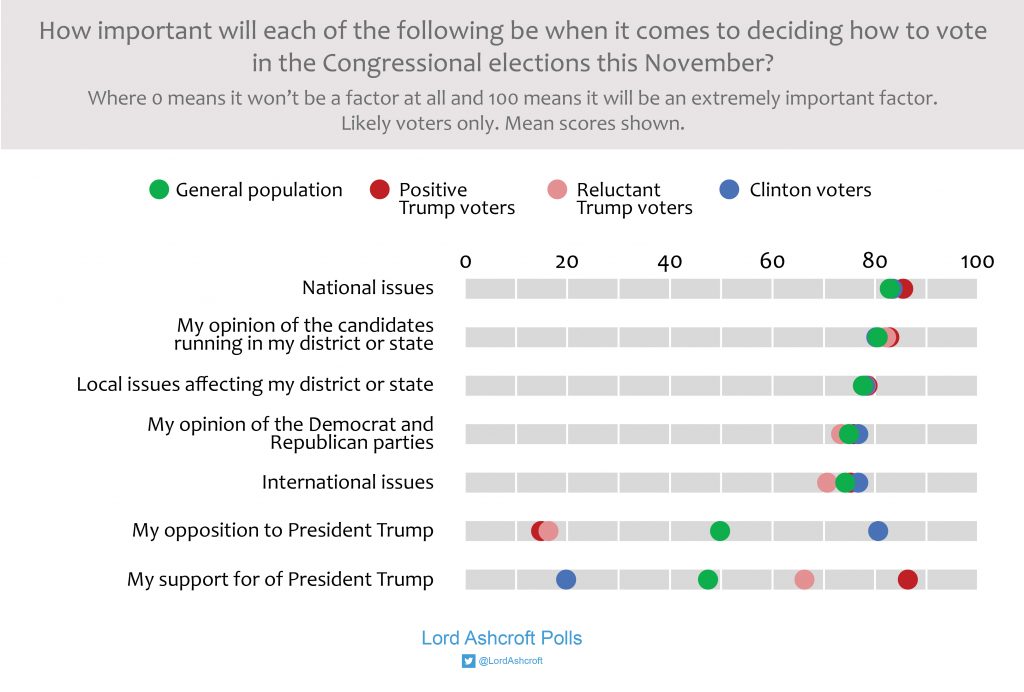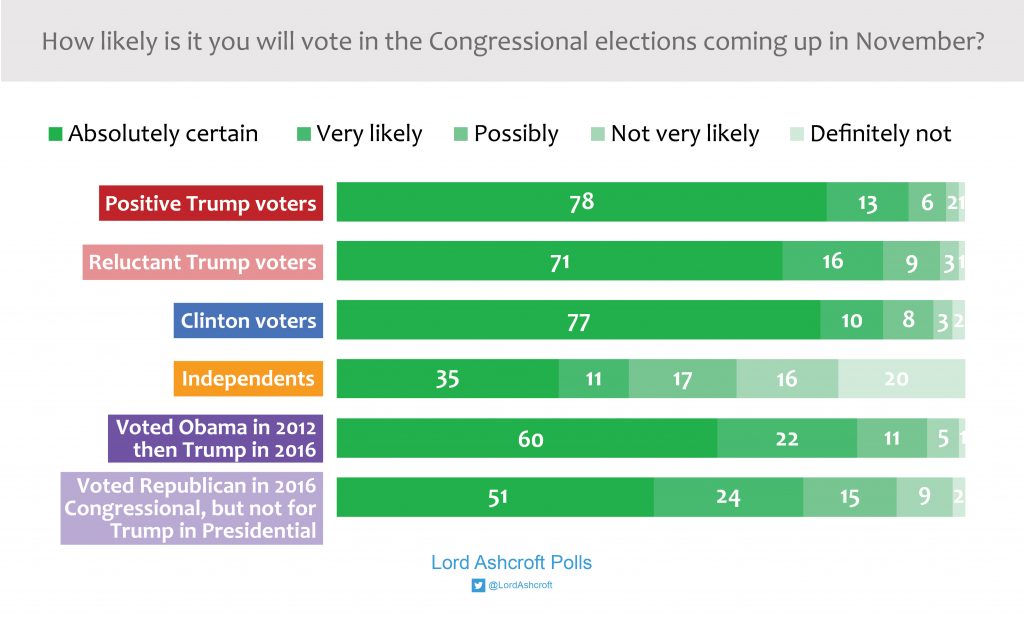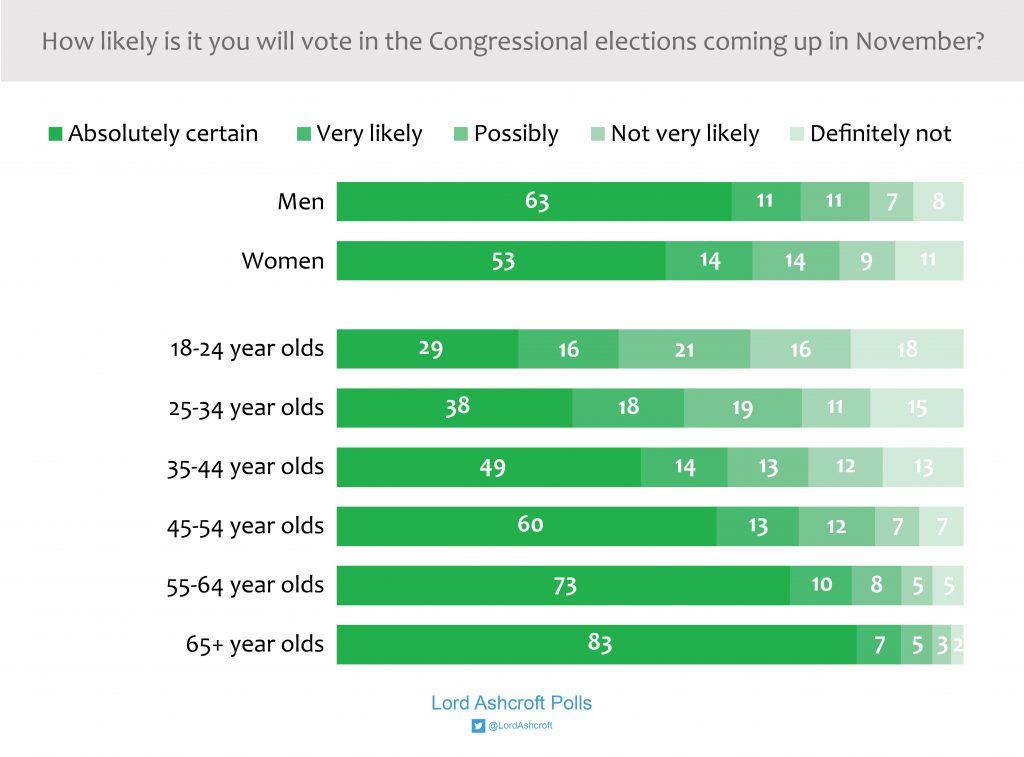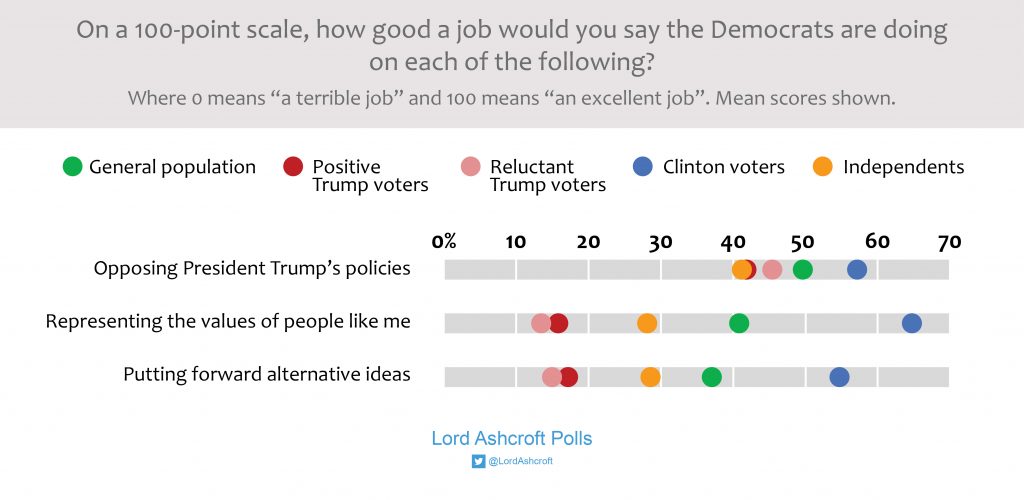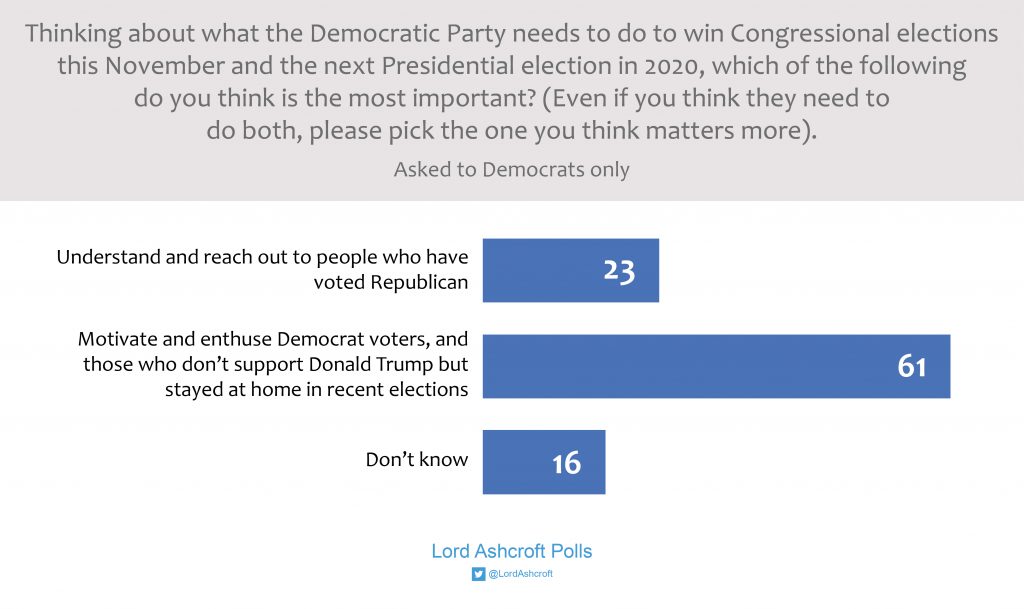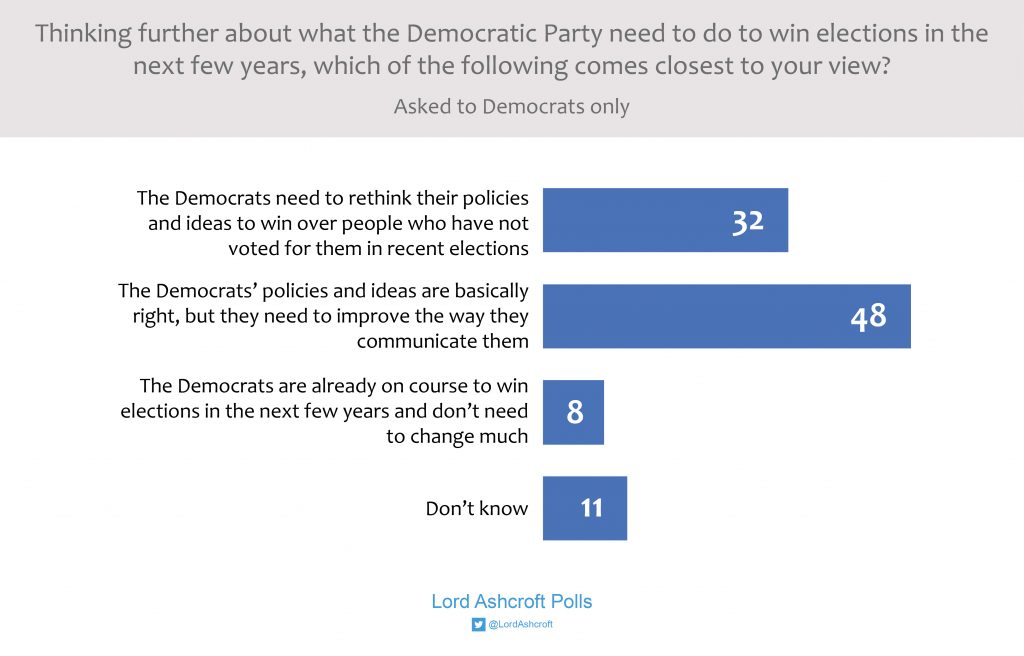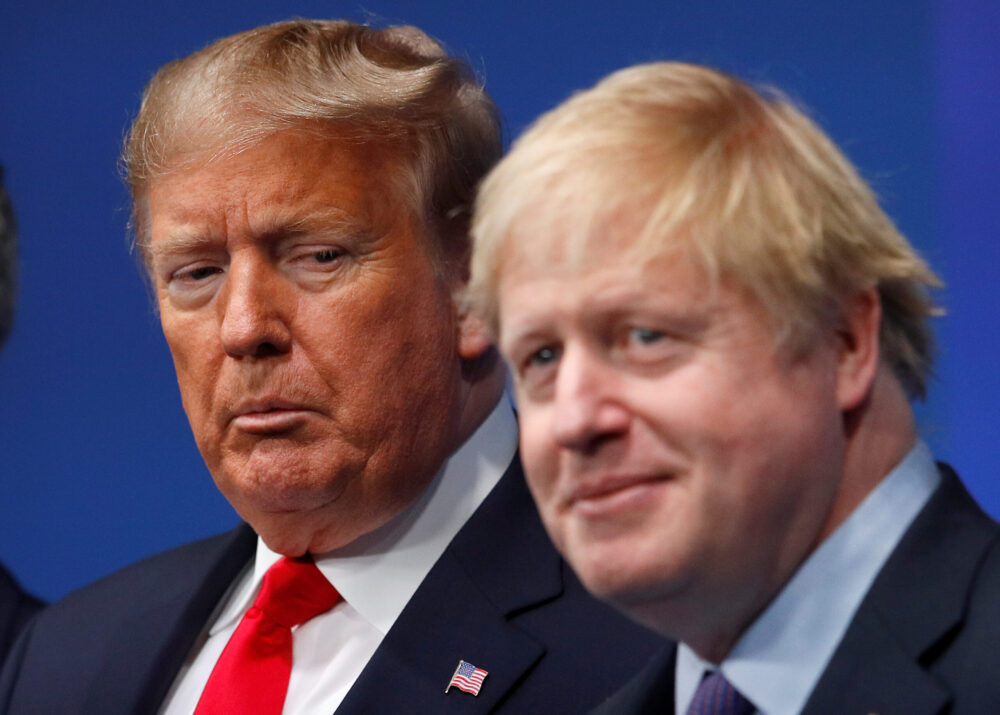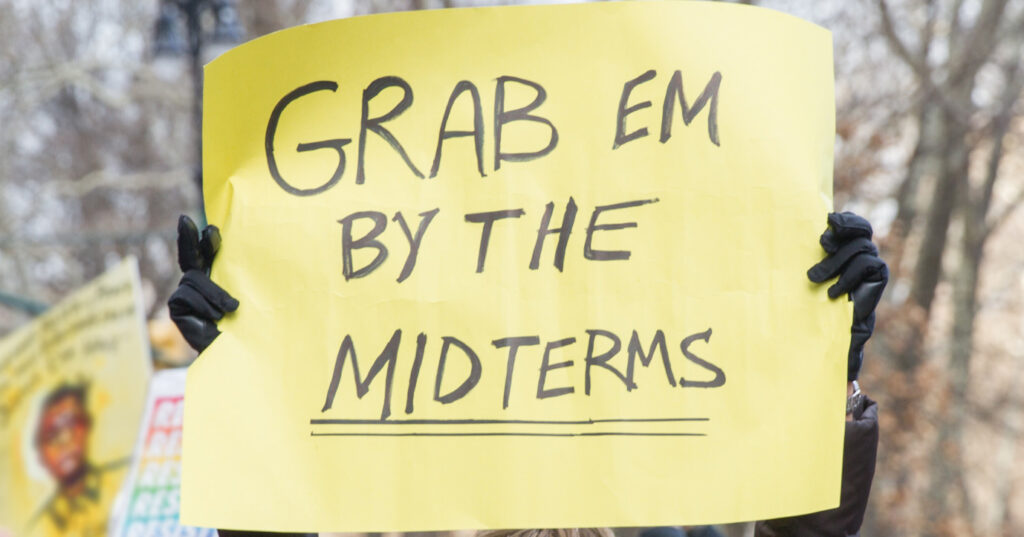
With two months to go until the midterm elections, I have conducted a 6,000-sample poll of American voters to provide a snapshot of the national mood as the campaigns get fully into gear.
To start with the biggest-picture question of all, is the country heading in the right direction, or is it off on the wrong track?
Nobody will be surprised to hear that those who voted positively for Donald Trump overwhelmingly think things are going well, that those who did so reluctantly in order to stop Hillary Clinton are less sure, and that those who voted against him think things are going very badly indeed. Independent voters match the population as a whole – just over half say the country is on the wrong track, with 36% saying things are heading the right way.
What might be more significant is the change since we last ask the question nearly a year ago.
Since last October there has been a marked shift towards the optimistic view, including a 14-point increase among both positive and reluctant Trump voters saying the country is on the right track.
When we ask specifically about the economy, the optimism rises further. A majority of the population, whose numbers again mirror those for independent voters, expect the economy to do well over the next year both for the country as a whole and for themselves and their families.
Whether this is down to Trump is a different question. We find in our focus groups that his voters see a direct connection between his presidency, new jobs and a rising stock market, while others are naturally more reluctant to give him the credit.
We also see a further split along political lines. While Trump supporters are slightly more optimistic for the country as a whole than they are for their own household, his opponents are more likely to think that the country is going to the dogs but they personally will be fine.
We also found a big increase across the board in the numbers saying they believe progress is being made in delivering President Trump’s agenda. For Trump voters, there has been a big shift in sentiment towards believing “a great deal” of progress has been made, rather than merely “some progress,” which was the most popular answer a year ago.
A majority of voters overall now believe progress is being made, as do nearly six in ten Independent voters, and more than three quarters of those who voted for Republicans in the 2016 Congressional elections but not for Donald Trump.
Overall, those who think little or no progress is being made in delivering the Trump agenda say the President himself is most to blame – and the same is true for his own more reluctant voters.
Stronger Trump supporters, however, are most likely to name Democrats in Congress as the biggest barrier to progress. But next on their list are Congressional Republicans – a view that won’t exactly propel them to back the GOP in November with a spring in their step.
Most of the coverage of Donald Trump, and certainly a good deal of the criticism, seems to focus on the way he behaves rather than what he does. But for the people who voted for him, the emphasis is precisely the other way round. Seven in ten of those who voted for him positively both like what he is doing as President andapprove of his character and personal conduct. A further one in four like what he is doing even though they don’t always like his behaviour.
The separation between personality and performance is most striking for those who voted for him mainly to stop Hillary Clinton.
While less than a third of these reluctant Trump voters say they approve of his character and personal conduct, nearly nine out of ten say they like what he is doing as President. The salient fact about these people is not that they have reservations about Donald Trump, it is that they decided to discount these reservations and vote for him anyway.
Yet the President’s critics always seem to fall into what I call the “surely now” fallacy. After every new tweet or supposed outrage they seem to think that surely now his voters will see what a terrible mistake they have made.
I suspect Trump’s opponents will make little progress in eroding his support as long as they continue to talk about conduct while his electoral coalition is more interested in delivery.
So what do they think he is delivering? Not surprisingly, positive Trump supporters give him very high marks for nearly everything. His more hesitant voters give more variable scores, but are happiest of all with the economy and jobs, and with the President’s nominations to the Supreme Court.
For Independents and voters as a whole, the highest scores – albeit only middling on average – are for his performance on the economy.
Another way to look at this is to ask what people think will be remembered as the most significant things about the Trump presidency in 20 years’ time. For the country as a whole, the most popular answer was “the way Donald Trump has gone about doing the job of President”, and it’s hard to disagree with that.
For Democrats, it is the Mueller investigation for which he will chiefly be remembered.
But for his own voters, and especially his more reluctant ones, it is his Supreme Court nominations that stand out. This reflects what we heard in our focus groups during the campaign, when Republicans torn over whether they could vote for Trump often told us this was the decisive factor. Whatever you think of Donald Trump as a person, they said, you can’t mess around when it comes to the Supreme Court.
As an aside, it is interesting to look at how people see history shaping up according to where they get their news from.
For those who get most of their news from MSNBC or CNN, the most significant aspects have been the Mueller investigation, the separation of illegal immigrants from their children, and either the way Trump has gone about his job, or his relationship with President Putin.
But according to Fox News viewers, history will remember the Supreme Court nominations, the performance of the economy and the stock market, and Trump’s election victory itself against many people’s expectations.
While Democrats see the Mueller investigation as the most important development of the Trump presidency and a potential route to removing him from office, his own voters continue to see it as a “witch hunt” – a phrase we have heard again and again in our focus groups around the country.
However, this latest poll does detect a slight shift in opinion among Trump supporters – away from thinking Russia did not try to influence the outcome of the election, and towards the idea that Russia didtry to influence the election but there was no collusion with the Trump campaign.
Meanwhile, around 8 in 10 Democrats think collusion took place and that Donald Trump himself was fully aware.
We see a similar pattern when it comes to Stormygate. The news that Michael Cohen had pleaded guilty to campaign finance violations broke days before our poll went into the field, so it was fresh in the minds of our respondents.
A small majority of Independent voters and the general public – and of course 9 out of 10 Democrats – believe illegal payments were made from the Trump campaign and that the President himself knew about them.
But the great majority of his voters, including the more reluctant ones, think either that no illegal payments were made or that any such payments were made without the knowledge of Donald Trump – despite the testimony of his former lawyer.
In our research we have always found most Trump voters to be stubbornly unimpressed by accusations of scandal. As someone told us in one of our focus groups in Mississippi earlier this year when we asked about the Stormy Daniels saga: “I want someone to work on our economy and protect our shores. I don’t care about the rest of this stuff, because that’s all between him and God”. You wouldn’t want to be married to him, someone added, but “We didn’t elect him to be a saint, we elected him to be a leader.”
All of which leads to the position that whether or not you think Donald Trump may have committed crimes that would warrant his impeachment depends almost entirely on whether or not you voted for him.
In political terms this is an extension of the point I made earlier about character and conduct. The more his opponents highlight the various investigations against him, the less progress they will make in trying to win round the voters they need if they are to beat him.
Part of this might be because many Democrats don’t think beating him will be a matter of convincing voters at all. Half of them think he will not run again in 2020, or will stand down as President before then.
Meanwhile, most Trump voters – including a clear majority of those who backed him only reluctantly in 2016 – are already looking forward to four more years.
As for whether he deservesto be re-elected, most of those who put him in the White House are already prepared to say Yes. That includes two thirds of those who voted for him reluctantly as a way of stopping Hillary Clinton, and a similar number of those who switched to him from Barack Obama – a group which we have always found in our research to be more muted in their praise for President Trump.
You will also see that the 33% overall saying he deserves to be re-elected is somewhat below the approval ratings we’ve seen in recent published polls. The difference is that it is one thing to say you approve of the job the President is currently doing, and another thing to say you already think he deserves to win the next election.
Obviously there are two ways to look at this. One is to observe that he has “lost” a large chunk of the voters who elected him. Another, which I lean towards, is that a strong majority of those who voted for Trump despite not liking him very much already think he has earned another term.
Not only that, they already put him among the greats. We asked our respondents to rank each President since Nixon. For Americans as a whole, the top three answers were Barack Obama, Ronald Reagan and Bill Clinton. Those who voted for Hillary chose Obama, Clinton and, believe it or not, Jimmy Carter.
But for Trump’s own people, he is already in the Hall of Fame. In fact those who voted for him positively two years ago now rank him above Ronald Reagan, a conservative icon.
What all this has to do with the midterm elections is that, as we know, support for Donald Trump and support for the Republican Party are not necessarily the same thing.
Even his more reluctant voters are more likely – and his strong supporters are much more likely – to say their views and priorities are represented by Donald Trump than by the Republican Party as a whole, let alone by Republicans in Congress.
Voters as a whole feel that local and Congressional Democrats do a slightly better job of representing them than local and Congressional Republicans.
How far will these things be a factor in the midterms? When we asked what would be important in their voting decision in November, voters as a whole put their support or opposition to President Trump well behind local and national issues, and their opinion of their local candidates.
However, his strongest supporters and opponents both but Trump himself among the most important factors in determining their vote.
As ever, it all depends who actually turns out to vote. When we asked them, the President’s strongest supporters and opponents were equally enthused – in both cases, nearly 8 in 10 said they were absolutely certain to vote in November.
Independent voters, and those who had switched to Trump from Obama, were notably less sure – or more honest – about the chances of their turning out.
Overall, exactly two thirds of both Republican and Democrat identifiers told us they were certain to vote in the Congressional elections. If they all do, we are heading for a record.
We hear a lot about the idea that younger voters are particularly motivated to turn out this year. As you know, modelling likely turnout is one of the biggest headaches for pollsters, mostly because when asked if they will bother to vote, people tend to give themselves the benefit of the doubt. This means that predicted surges in turnout are often taken with a pinch of salt, so that when such surges dooccur they can take us by surprise.
In our current survey, fewer than 3 in 10 of American 18 to 24 year-olds said they were absolutely certain to vote, with likelihood to vote rising steadily through the age groups. Even by these numbers, as I say, participation would be extremely high for a midterm election, where we usually see turnout of around 40%.
Whatever happens in the midterms, the prospects for the next presidential election is a different question. There is a wise adage in American politics that “you can’t beat something with nothing”, so we asked how people thought the Democrats were doing in various aspects of their job.
When it comes to opposing President Trump’s policies, the answer is “not too badly”. However, people thought the party was doing rather less well as “representing the values of people like me,” and even less well at “putting forward alternative ideas.”
This was particularly true of Independent voters, and those who had voted only reluctantly for Trump – a group that perhaps ought to be high on the Democrats’ target list.
A further question explained why this doesn’t currently seem to be the case. We asked Democrat identifiers who they thought it was most important to reach out to if they were to win this November and in 2020.
Just under a quarter thought they needed to understand and reach out to people who have voted Republican in recent elections.
The clear majority thought their party’s priority should be to motivate and enthuse existing Democrat voters and those who had stayed at home in recent elections.
We looked further into this by asking how the party needed to act in the next few months and years.
By far the biggest single group – nearly half of all Democrats – think the party’s policies and ideas are basically right, they just need to communicate them better. A further 8% thought they were already on course to win elections in the next few years and didn’t need to change much at all.
A majority of Democrats, therefore, think they need to nothing more than present themselves better in order to take back the country. Fewer than one third say they need to rethink their policies and ideas to win over people who have not voted for them in recent elections.
Combined with the earlier figure that only around one in 10 Democrats expects Donald Trump to be re-elected, I think this is one of the most telling points about the future of American politics in the years to come. If the Democrats’ direction is set by their most committed activists, we know from previous research that those activists are far removed in terms of values and outlook from the kind of voters who deserted the party in the Midwest two years ago. It would be brave of the Democrats to decide it didn’t need any of those voters back.
Here again there are echoes of the UK. After the Labour landslide of 1997 it took the Conservatives 8 years to take the hint and start making the changes they needed. When they managed to unseat Gordon Brown in 2010, Labour supporters believed – just like today’s Democrats – that they had lost because voters didn’t understand the issues, the media hadn’t done its job properly, and that their own policies had been right but not sufficiently well communicated. They went on to choose as their leader Ed Miliband, the candidate who made them feel best about being in the Labour Party, after which they lost again, and promptly went even further into their comfort zone on the left – perhaps the main reason why the Tories still have the edge in the polls despite the political turmoil.
It remains to be seen whether the Democrats will do “the full Jeremy Corbyn” or whether they have the discipline to try to win back the voters they once took for granted. But that decision, as much as anything else, will determine what happens in two years’ time.
One reason I think the Democrats seem reluctant to reach out to Trump voters is that they haven’t quite forgiven them for electing him. Nearly half of Democrats told us that Trump-supporting Republicans didn’t just disagree how to achieve positive aims, they were “bad people who want the wrong things for America”.
And even if that applies mainly to his most committed supporters, I think they feel that Trump voters as a whole made not just a bad decision but a wicked one. I also think – and there are no numbers to support this, but it comes across in our focus groups – that Trump voters can sense this. They won’t switch to a party that they think doesn’t like them.
Depressingly enough, the same thing applies among Republicans – only half think Trump-opposing Democrats are good people who want good things for America. In other words, anyone looking forward to a new era of calm and consensus in American politics had better not hold their breath.
